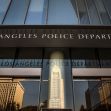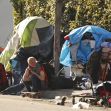San Francisco’s Tenderloin neighborhood is comprised of 50 square blocks that have a reputation for fostering illegal drug dealing, prostitution, strip clubs and homelessness. The City Attorney tried to ban four drug dealers from the area because they were public nuisances, but an appellate court said the requested relief was “too broad” while explaining that such a prohibition might be possible if its provisions were more narrow.
Writing for a unanimous three-judge panel in Division Two of the First Appellate District of California, Justice Dennis P. Miller denied the preliminary injunction issued by trial judge Ethan P. Schulman of the San Francisco County Superior Court. Schulman’s order would have banned four “street-level drug dealers” named Christian Noel Padilla-Martel, Victor Zelaya, Jarold Sanchez and Guadaloupe Aguilar-Benegas, all of whom had multiple arrests for drug dealing. The order completely banned them from entering the Tenderloin area.
To further its efforts to reduce drug-induced deaths and other health emergencies, prior to trial the City Attorney (City) filed a motion for preliminary injunctions against each of the four defendants and 24 other individuals whose cases were not before the appellate court. The injunction would prevent the defendants from entering the 50-block Tenderloin Drug Abatement Area by public transit, or by using area sidewalks.
The court acknowledged that the area is “rife with illegal drug dealing” and experiencing a “drug-related health crisis.” It also admitted that the City has the authority to seek injunctive relief to ban public nuisances and those who violate the Unfair Competition Law (UCL). But rather than ban their complete presence, the opinion said the City should just ban the defendants from selling illegal drugs.
The opinion defined public nuisance as something that annoys or damages entire communities or neighborhoods. Unfair competition includes any unlawful business act or practice.
Miller explained that a stay-away order “is not an authorized remedy under either the public nuisance law or (UCL).” In addition, he wrote that the City’s injunctive relief request would be “constitutionally impermissible” because it interferes with the “constitutional right to intrastate travel.” The trial judge noted that the City could not ban defendants from visiting “such a large area in the center of the city.” The appellate opinion said the City “failed to meet its evidentiary burden’ of proving the injunction would “minimally infringe upon defendants’ protected interests.”
The San Francisco government has proposed the establishment of the Tenderloin Drug Abatement Area which would comprise 50 square blocks and 221 acres. In support of its proposal, the City provided evidence that the crime rate in the area is three times higher than in the rest of San Francisco. A police captain testified that there had been 600 arrests for drug dealing in 2020 and 699 drug overdose deaths. The City also sought penalties for violation of the ban. There would be a $6,000 fine for each violation of the injunction and a $2,500 fine for a UCL violation.
But it would allow defendants to “conduct specified lawful business” at specific times as long as they received advance written notice, filed for a stipulation and carried a copy with them. A violation would be a crime under California Penal Code 166, which prohibits disorderly, contemptuous, or insolent behavior.
Defendants opposed the ban, arguing that at trial the City would not be able to show a likelihood of success. They also said the whole ban was using the defendants as “scapegoats in its ill-conceived effort to make a political point.” They provided testimony from several experts who said the ban would not alleviate the Tenderloin’s problems. The individual defendants also submitted declarations about their need to visit the area, not to sell drugs but to work, visit their children, get food, see doctors and take advantage of a variety of social services offered by non-profits in the area.
After reviewing all the declarations, the trial court decided the City “showed a likelihood of prevailing on its claims.” They said that drug dealing does constitute a public nuisance and that the UCL covers illegal drugs. But the trial court also ruled that neither law permitted the creation of an “exclusion zone.” Judge Schulman distinguished banning drug-related crimes from the complete removal of people.
The appellate opinion then explained that relief under either of these laws is limited and should be narrowly drawn to eliminate just the unlawful activity while not restricting lawful activities. Clearly, a ban on the selling of illegal drugs would be allowed, but it found no precedent that would permit “a neighborhood-wide exclusion zone as injunctive relief to abate a public nuisance or address an unfair business practice.”
The appellate opinion then determined that stay-away orders could possibly be legal. It explained that the stay-away order sought by the City swept more broadly than any ban that had been allowed by precedents, such as restrictions on where someone on probation could travel or where a gang may operate. “By no stretch of the imagination,” is the preliminary injunction narrowly tailored, and it also violated defendants’ constitutional right to intrastate travel, Miller wrote. He said that it does not prohibit conduct, it prohibits “mere presence in the exclusion zone.”
In conclusion, while denying the motion for a preliminary injunction, Miller emphasized that “we do not minimize the serious and pervasive harm caused by the flood of street-level drug sales in the Tenderloin.” But he also stressed that the City failed to show the trial court erred when it denied the ban that would impose unconstitutional limits on the four defendants.






